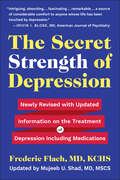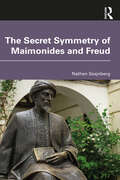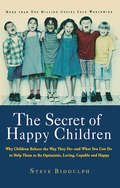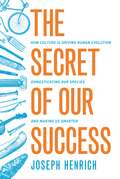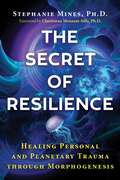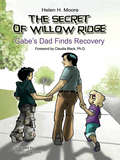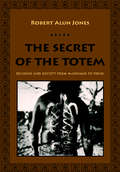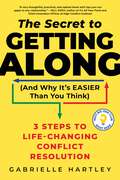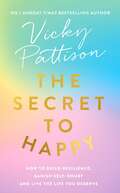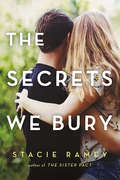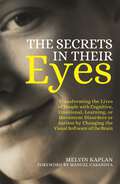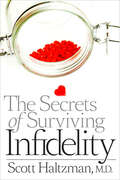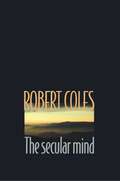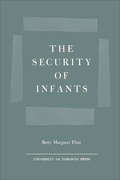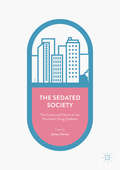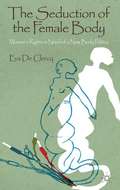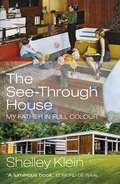- Table View
- List View
The Secret Strength of Depression, Fifth Edition: Newly Revised with Updated Information on the Treatment for Depression Including Medications
by Frederic FlachThe Secret Strength of Depression--a self-help classic which has helped millions suffering from depression to no longer feel trapped in stigma and shame--is now updated with new information on current and emerging medications and alternative therapies.The Secret Strength of Depression is a timeless, enduring self-help work that still offers invaluable insight on the subject of depression some 40 years after its original publication. This new edition includes the latest information on medications, alternative therapies, and more.Author Dr. Frederic Flach was one of the pioneers in the study of biology and depression and established the groundwork for the understanding of human resilience. Dr. Flach's positive, informative approach showed that, by tapping into their creative energy, an individual could turn their depression into a powerful force for personal growth.
The Secret Symmetry of Maimonides and Freud
by Nathan SzajnbergThe Secret Symmetry of Maimonides and Freud presents the parallels between The Guide of the Perplexed and The Interpretation of Dreams, considering how Maimonides might be perceived as anticipating Freud’s much later work. The Secret Symmetry of Maimonides and Freud suggests that humankind has secrets to hide and does so by using common mechanisms and embedding revealing hints for the benefit of the true reader. Using a psychoanalytic approach in tandem with literary criticism and an in-depth assessment of Judaica, Szajnberg demonstrates the similarities between these two towering Jewish intellectual pillars. Using concepts of esoteric literature from the Torah and later texts, this book analyses their ideas on concealing and revealing to gain a renewed perspective on Freud’s view of dreams. Throughout, Szajnberg articulates the challenges of reading translated works and how we can address the pitfalls in such translations. The book is a vital read for psychoanalysts in training and practice, as well as those interested in Judaica, the history of ideas, and early medieval studies.
The Secret of Happy Children: Why Children Behave the Way They Do--and What You Can Do to Help Them to Be Optimistic, Loving, Capa
by Steve BiddulphPsychologist and family counselor Steve Biddulph has been hailed as a "childhood guru" (The Guardian) and a "publishing phenomenon" (the Times, London), and this is his landmark book, the foundation for his major international reputation. <P><P>With unparalleled clarity, common sense, and warmth, The Secret of Happy Children instructs all parents about parent-child communication from babyhood to teens. It gives parents confidence to be more themselves as parents—stronger, more loving, more definite, more relaxed. Biddulph reveals what is really happening inside kids' minds and what to do about it. <P>He covers a wide variety of issues important to a child's—and a parent's—happiness, including stopping tantrums before they begin, curing shyness, the link between food and behavior, and much more. Parents will find themselves letting go of old, negative approaches and freeing up more energy to enjoy their kids and their own lives.
The Secret of Nightingale Wood (Chicken House Novels Ser.)
by Lucy StrangeA beautifully tangled story of friendship, fairy tales, and family secrets. For those who loved Pax and The War That Saved My Life.A Kirkus Best Middle Grade Book of 2017An Amazon Best Book of 2017A 2018 Bank Street College Best Book of the Year A Telegraph Top 50 Book of the YearEveryone is too busy to pay attention to Henrietta and the things she sees -- or thinks she sees -- in the shadows of their new home, Hope House. Mama is ill. Father has taken a job abroad. Nanny Jane is busy taking care of her younger sister.All alone, with only stories for company, Henry discovers that Hope House is full of strange secrets: a forgotten attic, ghostly figures, mysterious firelight that flickers in the trees beyond the garden.One night she ventures into the darkness of Nightingale Wood. What she finds there will change her whole world...
The Secret of Our Success: How Culture Is Driving Human Evolution, Domesticating Our Species, and Making Us Smarter
by Joseph HenrichHumans are a puzzling species. On the one hand, we struggle to survive on our own in the wild, often failing to overcome even basic challenges, like obtaining food, building shelters, or avoiding predators. On the other hand, human groups have produced ingenious technologies, sophisticated languages, and complex institutions that have permitted us to successfully expand into a vast range of diverse environments. What has enabled us to dominate the globe, more than any other species, while remaining virtually helpless as lone individuals? This book shows that the secret of our success lies not in our innate intelligence, but in our collective brains--on the ability of human groups to socially interconnect and learn from one another over generations. Drawing insights from lost European explorers, clever chimpanzees, mobile hunter-gatherers, neuroscientific findings, ancient bones, and the human genome, Joseph Henrich demonstrates how our collective brains have propelled our species' genetic evolution and shaped our biology. Our early capacities for learning from others produced many cultural innovations, such as fire, cooking, water containers, plant knowledge, and projectile weapons, which in turn drove the expansion of our brains and altered our physiology, anatomy, and psychology in crucial ways. Later on, some collective brains generated and recombined powerful concepts, such as the lever, wheel, screw, and writing, while also creating the institutions that continue to alter our motivations and perceptions. Henrich shows how our genetics and biology are inextricably interwoven with cultural evolution, and how culture-gene interactions launched our species on an extraordinary evolutionary trajectory. Tracking clues from our ancient past to the present, The Secret of Our Success explores how the evolution of both our cultural and social natures produce a collective intelligence that explains both our species' immense success and the origins of human uniqueness.
The Secret of Resilience: Healing Personal and Planetary Trauma through Morphogenesis
by Stephanie MinesRestore resilience at its developmental source through energy medicine• Shares the author&’s journey of learning the healing art of Jin Shin, discovering the embryological roots of resilience, and healing her own trauma• Explores how the Jin Shin sites correlate with the Chinese Extraordinary Meridians and with specific embryological events• Shows how subtle touch in combination with trauma resolution amplifies neuroresilience, enhances creativity, restores motivation, and heals the fragmentation and disconnection associated with trauma and shockWhen neuroscientist Stephanie Mines started practicing the hands-on healing Art of Compassion, she began to unravel the mystery of trauma and the secret to resilience. As a survivor of early childhood abuse, police brutality as a social justice activist, and a series of dysfunctional and abusive relationships, Mines was profoundly curious about how the human nervous system finds resilience despite the cumulative burden of chronic stress and traumatic life events. While earning her doctorate in neuropsychology, she met Mary Iino Burmeister, master of the Art of Compassion, or Jin Shin Jyutsu. Art of Compassion consists of non-invasive touch, using the fingertips, on sites of the body that are similar to acupuncture points. After the Art of Compassion helped Mines resolve her own trauma and awaken her innate resilience, she began to incorporate it into her clinical research. She discovered that the map of the body she learned from Burmeister sites correlated with the Chinese Extraordinary Meridians or Rivers of Splendor, which develop prenatally. She then began investigating our earliest neurodevelopmental processes and was able to correlate the Extraordinary Meridians with specific embryological events. She found that subtle touch on these sites in combination with trauma resolution amplifies neuroresilience, enhances creativity, restores motivation, and heals the fragmentation and disconnection associated with trauma and shock. Sharing her personal journey as a Wounded Healer, Mines reveals not only how to unlock the secrets of resilience for individual healing but also how embodied resilience will help us heal our wounded planet.
The Secret of Willow Ridge
by Claudia Black Helen H. Moore John C. BlackfordLikeable Gabe makes the journey from being an almost friendless, unhappy, and skeptical young boy reeling from mistreatment at the hands of his addicted father and the effects the disease of addiction have had on his family, to a hopeful, happy youngster who takes pride in his dad's greatest accomplishment: recovery.
The Secret of the Totem: Religion and Society from McLennan to Freud
by Robert Alun JonesThough it is now discredited, totemism once captured the imagination of Sigmund Freud, Émile Durkheim, James Frazer, and other prominent Victorian thinkers. In this lively intellectual history, Robert Alun Jones considers the construction of a theory and the divergent ways religious scholars, anthropologists, psychoanalysts, and cultural theorists drew on totemism to explore and define primitive and modern societies' religious, cultural, and sexual norms. Combining innovative readings of individual scholars' work and a rich portrait of Victorian intellectual life, Jones brilliantly traces the rise and fall of a powerful idea. First used to describe the belief systems of Native American tribes, totemism ultimately encompassed a range of characteristics. Its features included belief in a guardian spirit that assumed the form of an a particular animal; a prohibition against marrying outside the clan combined with a powerful incest taboo; a sacrament in which members of the totemic clan slaughtered a representative of the totemic species; and the tracing of descent through the female rather than the male. These attributes struck a chord with the late Victorian mentality and its obsession with inappropriate sexual relations, evolutionary theory, and gender roles. Totemism represented a set of beliefs that, though utterly primitive and at a great evolutionary distance, reassured Victorians of their own more civilized values and practices.Totemism's attraction to Victorian thinkers reflects the ways in which the social sciences construct their objects of study rather than discovering them. In discussing works such as Freud's Totem and Taboo or Frazer's The Golden Bough, Jones considers how theorists used the vocabulary of totemism to suit their intellectual interests and goals. Ultimately, anthropologists such as A. A. Goldenweiser, Franz Boas, and Claude Lévi-Strauss argued that totemism was more a reflection of the concerns of Victorian theorists than of the actual practices and beliefs of "primitive" societies, and by the late twentieth century totemism seemed to have disappeared altogether.
The Secret to Complete Contentment: How a Life with Jesus Brings Ultimate Peace (A 60-Day Devotional)
by Jack CountrymanDiscover the secret of how to let go of the restlessness in your heart so you can feel true fulfillment.If only I didn't feel so burned out.If only I wasn't so lonely.If only I wasn't so concerned about impressing others.If only I had that job.If only this relationship was different.We all dream about how if one thing was different in our lives it would finally make us content. But once we get the very thing we wished for, we are still left wanting more. Is it even possible to feel peaceful and satisfied in life?Wishing for "more" in life usually leaves you feeling unfulfilled and anxious--especially when we realize that more will never be enough. In The Secret to Complete Contentment beloved Bible teacher and bestselling author Jack Countryman offers Bible verses and 60 thoughtful reflections to reveal why living in the love of Jesus is the only way to know true, lasting contentment. In these pages you'll discover:The freedom that comes from finding contentment apart from circumstancesWhy you can rest--physically, spiritually, and emotionally--in God's abundant loveHow to strengthen your trust in who God is and how He provides for you The Secret to Complete Contentment is an ideal gift for:Anyone struggling to overcome anxiety, envy, or discouragementNew Christians and faith seekersThose transitioning into a new phase of life: a new school, an empty nest, or even retirementFriends or family looking for a simple yet powerful daily devotional to help them find happiness As you journey through this beautiful devotional, you will learn to let go of the restlessness that comes from trying to find contentment outside God's love and instead find true peace as you live at the center of His will. Although the world may promise that you can have everything you want, only God can give everything you need. The Secret to Complete Contentment reminds you that God so deeply longs for a relationship with you that He created you to be satisfied with nothing less than life with Him.
The Secret to Getting Along (And Why It's Easier Than You Think): 3 Steps to Life-Changing Conflict Resolution
by Gabrielle HartleyNamed as a Next Big Idea Club Must Read!Is it possible to get along better? Yes, with 3 simple steps for conflict resolution!Conflict is everywhere—in our homes, at work, on our social media feeds. But conflict isn't inherently bad… in fact, it's a normal and healthy part of human relationships, but many of us aren't good at managing conflict in our everyday lives. In The Secret to Getting Along (And Why it's Easier Than You Think!), attorney Gabrielle Hartley brings more than two decades of divorce mediation experience to helping you learn how to resolve conflict in ways that strengthen your relationships, reflect your values, and lead to positive outcomes for everyone involved. This practical and accessible guide to everyday conflict resolution will help you:Reframe your approach to conflictFind your way to more harmony and less discordCreate better outcomes even in your most difficult relationshipsExperience more peace even when relationships don't go wellStrengthen your skills in resolving conflicts of all shapes and sizesFeel more connected to the important people in your lifeWhether you're fighting with your partner about housework, struggling to set boundaries with a difficult family member, or dealing with a toxic coworker, The Secret to Getting Along (And Why It's Easier Than You Think!) is a necessary resource for navigating difficult conversations and situations—and finding the solutions that will help you create a peaceful, less stressful, and more fulfilling life.
The Secret to Happy: How to build resilience, banish self-doubt and live the life you deserve
by Vicky PattisonThe debut self-help book from Vicky Pattison, on how to quash your inner doubts, overcome fear and live a happier life."If there's any woman out there who is feeling like they're going through things on their own, or they're worried that they're not achieving what they should be, or feeling or looking how they should, I want this book to let you know you're not alone."In over a decade on television, Vicky Pattison has had her fair share of ups and downs, from her rise to fame on Geordie Shore to her public break-up with her fiancé, her body confidence issues and debilitating anxiety. In The Secret to Happy, Vicky opens up about her darkest moments and shares the pearls of wisdom and hard-won lessons she's picked up along the way - to overcoming heartbreak, ending toxic relationships and managing her mental health - to help you find inner strength, accept imperfections and be true to yourself.Brave, honest and insightful, with Vicky's trademark Geordie humour, The Secret to Happy is an empowering and uplifting guide to help you find your own kind of happiness, whatever that looks like.
The Secret to Happy: How to build resilience, banish self-doubt and live the life you deserve
by Vicky PattisonThe debut self-help book from Vicky Pattison, on how to quash your inner doubts, overcome fear and live a happier life."If there's any woman out there who is feeling like they're going through things on their own, or they're worried that they're not achieving what they should be, or feeling or looking how they should, I want this book to let you know you're not alone."In over a decade on television, Vicky Pattison has had her fair share of ups and downs, from her rise to fame on Geordie Shore to her public break-up with her fiancé, her body confidence issues and debilitating anxiety. In The Secret to Happy, Vicky opens up about her darkest moments and shares the pearls of wisdom and hard-won lessons she's picked up along the way - to overcoming heartbreak, ending toxic relationships and managing her mental health - to help you find inner strength, accept imperfections and be true to yourself.Brave, honest and insightful, with Vicky's trademark Geordie humour, The Secret to Happy is an empowering and uplifting guide to help you find your own kind of happiness, whatever that looks like.
The Secret to Happy: How to build resilience, banish self-doubt and live the life you deserve
by Vicky PattisonTHE IMMEDIATE SUNDAY TIMES BESTSELLERThe debut self-help book from Vicky Pattison, on how to quash your inner doubts, overcome fear and live a happier life."If there's any woman out there who is feeling like they're going through things on their own, or they're worried that they're not achieving what they should be, or feeling or looking how they should, I want this book to let you know you're not alone."In over a decade on television, Vicky Pattison has had her fair share of ups and downs, from her rise to fame on Geordie Shore to her public break-up with her fiancé, her body confidence issues and debilitating anxiety. In The Secret to Happy, Vicky opens up about her darkest moments and shares the pearls of wisdom and hard-won lessons she's picked up along the way - to overcoming heartbreak, ending toxic relationships and managing her mental health - to help you find inner strength, accept imperfections and be true to yourself.Brave, honest and insightful, with Vicky's trademark Geordie humour, The Secret to Happy is an empowering and uplifting guide to help you find your own kind of happiness, whatever that looks like.
The Secrets We Bury
by Stacie RameyIn an effort to escape his family, Dylan sets out on the Appalachian trail—but he can't escape his past—or his secrets in this novel from the author of The Sister Pact.Dylan Taggart is on the run. His family is trying to put him in a school for psychologically challenged students, and he gets it—he has issues. But a special school is a complete overreaction. And in six months, he'll be a legal adult, so Dylan decides to disappear on the Appalachian Trail until he can make his own decisions.Dylan wanted independence, but setting out on a 2,190-mile hike by himself is more than he bargained for. And he keeps crossing paths with another teen hiker, known only as "The Ghost." This mysterious girl is also making the trek alone, and Dylan can tell she's trying to escape too. But from what? When disaster strikes, how can they trust each other if they can't face their own secrets?
The Secrets in Their Eyes: Transforming the Lives of People with Cognitive, Emotional, Learning, or Movement Disorders or Autism by Changing the Visual Software of the Brain
by Manuel F. Casanova Melvin KaplanVision therapy techniques can correct not only visual problems, but also cognitive, emotional and physical difficulties. Based on the pioneering work of Dr Melvin Kaplan, this research-based book explains the basis of vision therapy, who it can help, and the outcomes it can bring. Visual perceptual problems can cause an array of difficulties, from reading and writing, to issues with balance, clumsiness, and tunnel vision. Severe symptoms can lead to a diagnosis of anxiety, depression, learning disability or even autism. In this groundbreaking book, Dr Kaplan shows how these symptoms point to interventions that change the way that the eyes process information, permanently counteracting visual deficits and impacting on behaviour. Case studies demonstrate how to plan and implement visual management programs according to a patient's symptoms, illustrating the wide range of life-changing results that vision therapy can achieve for people of all ages, regardless of severity of symptoms. Dr Kaplan also shares his expert knowledge of ambient yoked prisms - a tool that transforms light to alter visual stimulation, dramatically transforming perception and cognition. This accessible book presents readers - including parents and families, clinicians, and other professionals working with individuals with visual perception problems - with a comprehensive introduction to the benefits and methods of vision therapy.
The Secrets of De Courcy Square: The gripping new page-turner from the author of The Ballroom Cafe and The Judge's Wife
by Ann O'LoughlinWhat if your life was built on a lie...? When Cora Gartland learns that long-term partner, Jack, has been killed in a car crash in Ireland her world falls apart. But she soon discovers that there was another woman in the car: a wife he'd never told her about.Devastated, she flies to Dublin to try to make sense of Jack's secret life. As she grieves, Cora must find the truth and a way to move forward. But what else was Jack keeping from her and how will she survive this betrayal...?Praise for Ann O' Loughlin'An addictive page-turner with plenty of unexpected twists and reveals in store' READER'S DIGEST'A moving tale of loss, love and redemption' BELLA MAGAZINE'Deftly written, moving and courageous' THE SUNDAY TIMES'Unputdownable' KATE KERRIGAN 'Romantic...[but] scandals lie in wait' IRISH INDEPENDENT'A highly engaging debut you will want to dive into' SUNDAY INDEPENDENT, IRELAND'A lovely story of two women with the courage to confront the injustices of the past' KATHLEEN MACMAHON
The Secrets of Hawthorn Place: A heartfelt and charming dual-time story of the power of love
by Jenni Keer'This is definitely up there as one of the best books that I have read. It's got a special place in my heart. Just amazing!' 5* reader reviewLove will always find a way . . . Discover the intriguing secrets of Hawthorn Place in this heartfelt dual-time novel, filled with warmth and charm, perfect for fans of Lucinda Riley and Cecelia Ahern.'An exquisitely detailed and enchanting love story' HEIDI SWAIN'An epic love story, mixed with gorgeous settings, a great deal of mystery and intrigue, lots of laughs, a few tears and fabulous characters, made this an absolute delight to read' KIM NASH'An absolutely wonderful dual time story that captivated me . . . and kept me spellbound' CHRISTINA COURTENAY'A beautifully intriguing love story, that . . . stays with you long after the last page' ROSIE HENDRY'Unforgettable and unique, the twists and turns of this enchanting book are woven together with threads of love and magic. I loved it!' CLARE MARCHANT........................................................................Two houses, hundreds of miles apart . . . yet connected always.When life throws Molly Butterfield a curveball, she decides to spend some time with her recently widowed granddad, Wally, at Hawthorn Place, his quirky Victorian house on the Dorset coast. But cosseted Molly struggles to look after herself, never mind her grieving granddad, until the accidental discovery of an identical Arts and Crafts house on the Norfolk coast offers her an unexpected purpose, as well as revealing a bewildering mystery. Discovering that both Hawthorn Place and Acacia House were designed by architect Percy Gladwell, Molly uncovers the secret of a love which linked them, so powerful it defied reason. What follows is a summer which will change Molly for ever . . .........................................................................'One of those wonderful, magical stories that appear rarely and stay in your heart forever' CELIA ANDERSON'A marvellous dual-time novel filled with mystery, fabulous detail and an enduring love story' MADDIE PLEASE'A wonderful, page-turning story full of intrigue and romance' VICTORIA CONNELLY'I found the book enchanting' SUZANNE SNOW'An enchanting storyline and engaging characters make this book a delight to read' LYNNE SHELBY'A beautifully written timeslip . . . Highly recommended. Five stars' ERIN GREEN'The perfect mix of mystery, magic, and romance' KATE G. SMITHEarly readers are captivated by The Secrets of Hawthorn Place:'A sweeping five stars from me for this novel that defies time but trusts in love''A sheer delight to read and can highly recommend''Utterly brilliant. The storyline is riveting, you never quite know what could be about to happen as it's constantly twisting and turning . . . such a beautiful book'
The Secrets of Hawthorn Place: A heartfelt and charming dual-time story of the power of love
by Jenni Keer'This is definitely up there as one of the best books that I have read. It's got a special place in my heart. Just amazing!' 5* reader review'Gorgeous! Exuberant writing, convincing, adorable characters, romance and a little whimsy' TRACY REESLove will always find a way . . . Discover the intriguing secrets of Hawthorn Place in this heartfelt dual-time novel, filled with warmth and charm, perfect for fans of Lucinda Riley and Cecelia Ahern.'An intriguing dual timeline tale that weaves together interesting characters and history, with an added touch of magic' BELLA OSBORNE'An exquisitely detailed and enchanting love story' HEIDI SWAIN'An epic love story, mixed with gorgeous settings, a great deal of mystery and intrigue, lots of laughs, a few tears and fabulous characters, made this an absolute delight to read' KIM NASH'An absolutely wonderful dual time story that captivated me . . . and kept me spellbound' CHRISTINA COURTENAY'A beautifully intriguing love story, that . . . stays with you long after the last page' ROSIE HENDRY'Unforgettable and unique, the twists and turns of this enchanting book are woven together with threads of love and magic. I loved it!' CLARE MARCHANT........................................................................Two houses, hundreds of miles apart . . . yet connected always.When life throws Molly Butterfield a curveball, she decides to spend some time with her recently widowed granddad, Wally, at Hawthorn Place, his quirky Victorian house on the Dorset coast. But cosseted Molly struggles to look after herself, never mind her grieving granddad, until the accidental discovery of an identical Arts and Crafts house on the Norfolk coast offers her an unexpected purpose, as well as revealing a bewildering mystery. Discovering that both Hawthorn Place and Acacia House were designed by architect Percy Gladwell, Molly uncovers the secret of a love which linked them, so powerful it defied reason. What follows is a summer which will change Molly for ever . . .........................................................................'One of those wonderful, magical stories that appear rarely and stay in your heart forever' CELIA ANDERSON'A marvellous dual-time novel filled with mystery, fabulous detail and an enduring love story' MADDIE PLEASE'A wonderful, page-turning story full of intrigue and romance' VICTORIA CONNELLY'I found the book enchanting' SUZANNE SNOW'An enchanting storyline and engaging characters make this book a delight to read' LYNNE SHELBY'A beautifully written timeslip . . . Highly recommended. Five stars' ERIN GREEN'The perfect mix of mystery, magic, and romance' KATE G. SMITHEarly readers are captivated by The Secrets of Hawthorn Place:'A sweeping five stars from me for this novel that defies time but trusts in love''A sheer delight to read and can highly recommend''Utterly brilliant. The storyline is riveting, you never quite know what could be about to happen as it's constantly twisting and turning . . . such a beautiful book'
The Secrets of Hawthorn Place: A heartfelt and charming dual-time story of the power of love
by Jenni KeerLove will always find a way . . . Discover the intriguing secrets of Hawthorn Place in this heartfelt dual-time novel, filled with warmth and charm, perfect for fans of Lucinda Riley and Cecelia Ahern.'An exquisitely detailed and enchanting love story' HEIDI SWAIN'Unforgettable and unique, the twists and turns of this enchanting book are woven together with threads of love and magic. I loved it!' CLARE MARCHANT........................................................................Two houses, hundreds of miles apart . . . yet connected always.When life throws Molly Butterfield a curveball, she decides to spend some time with her recently widowed granddad, Wally, at Hawthorn Place, his quirky Victorian house on the Dorset coast. But cosseted Molly struggles to look after herself, never mind her grieving granddad, until the accidental discovery of an identical Arts and Crafts house on the Norfolk coast offers her an unexpected purpose, as well as revealing a bewildering mystery. Discovering that both Hawthorn Place and Acacia House were designed by architect Percy Gladwell, Molly uncovers the secret of a love which linked them, so powerful it defied reason. What follows is a summer which will change Molly for ever . . .........................................................................'One of those wonderful, magical stories that appear rarely and stay in your heart forever' CELIA ANDERSON'A marvellous dual-time novel filled with mystery, fabulous detail and an enduring love story' MADDIE PLEASE'I found the book enchanting' SUZANNE SNOW(P) 2021 Headline Publishing Group Ltd
The Secrets of Surviving Infidelity
by Scott HaltzmanThe secret to surviving infidelity can be summed up in one word: trust.Along with changes in the workplace and the explosive growth of electronic communications, there has been a skyrocketing rate of infidelity. Today, up to forty percent of American marriages endure the pain of a cheating partner. The media is filled with stories of married politicians finding their "soul mates" and titillating instances of unfaithful celebrities. But in the homes of ordinary people everywhere, infidelity triggers complex emotions and events that affect everyone involved. Many marriage and personal therapists have adopted a "me first" mentality, prompting hurt spouses to end their relationships. Psychiatrist Scott Haltzman, retired Brown University professor, recommends exactly the opposite. The Secrets of Surviving Infidelity teaches both the victim and the perpetrator of infidelity how to acknowledge their feelings, reduce their sense of despair, and begin the difficult task of rebuilding a strong relationship.People who cheat act much like those who have other addictions, and brain scans of love-struck individuals show a dramatic increase in the release of dopamine, the same brain neurochemical associated with cocaine abuse. Haltzman does not excuse infidelity by labeling it a sex addiction; it’s not orgasm that drives a partner to cheat. Instead, Haltzman coins the term "flame addiction" to describe how, like a moth drawn to the light, people feel compelled to have extramarital intimacy despite all the negative consequences.People who have been cheated on feel shame, rage, and injured self-esteem. Many of them fear abandonment and find it hard to cope. When both partners have made a commitment to move forward together, however, Dr. Haltzman validates each person's feelings and puts them into perspective, offering sound advice on how to recover their equilibrium and reestablish a committed, trust-filled relationship.
The Secular Mind
by Robert ColesDoes the business of daily living distance us from life's mysteries? Do most Americans value spiritual thinking more as a hobby than as an all-encompassing approach to life? Will the concept of the soul be defunct after the next few generations? Child psychiatrist and best-selling author Robert Coles offers a profound meditation on how secular culture has settled into the hearts and minds of Americans. This book is a sweeping essay on the shift from religious control over Western society to the scientific dominance of the mind. Interwoven into the story is Coles's personal quest for understanding how the sense of the sacred has stood firm in the lives of individuals--both the famous and everyday people whom he has known--even as they have struggled with doubt. As a student, Coles questioned Paul Tillich on the meaning of the "secular mind," and his fascination with the perceived opposition between secular and sacred intensified over the years. This book recounts conversations Coles has had with such figures as Anna Freud, Karen Horney, William Carlos Williams, Walker Percy, and Dorothy Day. Their words dramatize the frustration and the joy of living in both the secular and sacred realms. Coles masterfully draws on a variety of literary sources that trace the relationship of the sacred and the secular: the stories of Abraham and Moses, the writings of St. Paul, Augustine, Kierkegaard, Darwin, and Freud, and the fiction of George Eliot, Hardy, Meredith, Flannery O'Connor, and Huxley. Ever since biblical times, Coles shows us, the relationship between these two realms has thrived on conflict and accommodation. Coles also notes that psychoanalysis was first viewed as a rival to religion in terms of getting a handle on inner truths. He provocatively demonstrates how psychoanalysis has either been incorporated into the thinking of many religious denominations or become a type of religion in itself. How will people in the next millennium deal with advances in chemistry and neurology? Will these sciences surpass psychoanalysis in controlling how we think and feel? This book is for anyone who has wondered about the fate of the soul and our ability to seek out the sacred in our constantly changing world.
The Security of Infants (Heritage)
by Betty FlintThis book contains a great deal of information about the personality of young babies. But its greatest fascination lies not in the information it is able to supply but in the many unanswered questions it raises. The author is convinced that each baby manifests his particular personality qualities very early in life, and the way that these are received by the environment into which he has been thrust will largely determine how he will stand up to the stresses of his future life. The development of a mental health assessment form as a yardstick by which a large variety of babies can be evaluated should help unfold some of the teasing obscurities of personality as they are revealed in infancy. If personality is a constant from early life to adulthood, such an instrument, revealing basic qualities in infancy, should lead therefore to greater understanding through school age and to adulthood and help reveal the effect of environmental experiences on a growing child. The thesis of the book is that mental health in infancy is derived from a close dependent relationship with a mother-figure who gives a child an opportunity to form a dependent trust in her care and affection. From this relationship is derived the desire to become effortful, outgoing and independent in one's world, which leads eventually to trust in oneself as a person of uniqueness and worth. The book should have greatest appeal to child care workers, psychiatrists and pediatricians. Research centres for child development should be interested in the experimental aspect of the work.
The Sedated Society
by James DaviesThis edited volume provides an answer to a rising public health concern: what drives the over prescription of psychiatric medication epidemic? Over 15% of the UK public takes a psychiatric medication on any given day, and the numbers are only set to increase. Placing this figure alongside the emerging clinical and scientific data revealing their poor outcomes and the harms these medications often cause, their commercial success cannot be explained by their therapeutic efficacy. Chapters from an interdisciplinary team of global experts in critical psychopharmacology rigorously examine how pharmaceutical sponsorship and marketing, diagnostic inflation, the manipulation and burying of negative clinical trials, lax medication regulation, and neoliberal public health policies have all been implicated in ever-rising psycho-pharmaceutical consumption. This volume will ignite a long-overdue public debate. It will be of interest to professionals in the field of mental health and researchers ranging from sociology of health, to medical anthropology and the political economy of health.
The Seduction of the Female Body
by Eva De ClercqDrawing on the ambiguous meaning of the notion of vulnerability, the book offers an innovative approach to the topic of the female body in relation to women's rights; going beyond the age-old dichotomy of casting women as either passive victims or conscious agents.
The See-Through House: My Father in Full Colour
by Shelley Klein'A charming account of a daughter, a house and a fastidious dad' Sunday TimesShelley Klein grew up in the Scottish Borders, in a house designed on a modernist open-plan grid. With colourful glass panels set against a forest of trees, it was like living in a work of art. Her father, Bernat Klein, was a textile designer whose pioneering colours and textures were a major contribution to 1960s and 70s style.Thirty years on, Shelley moves back home to care for her father, now in his eighties: the house has not changed and neither has his uncompromising vision - or his distinctive way of looking at the world. Told with great tenderness and humour, this is Shelley's account of looking after an adored yet maddening parent and a piercing portrait of the grief that followed his death. 'A sad, funny, utterly fascinating book about families, home and how to say goodbye' Mark Haddon'Original, moving and bracingly honest... often hilarious' Blake Morrison, Guardian'It is strange that grief should produce such a life-affirming book, but it has. Read it for the solace it contains, or for its captivating descriptions. Either way, it's a delight' Telegraph
